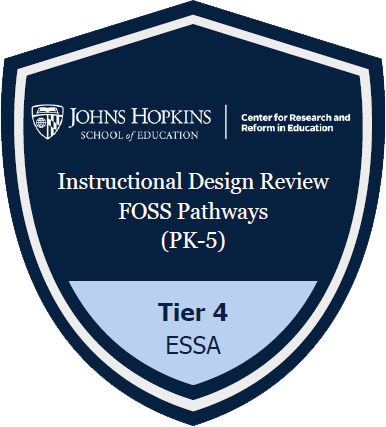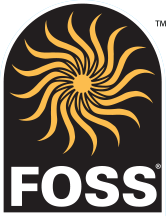FOSS® Pathways™ (PK-5) is an innovative, research-driven science curriculum with the power to transform science education for students in grades Pre-K through 5. Developed at The Lawrence Hall of Science, the program emphasizes hands-on, experience-based learning. This enables students to personally engage in scientific practices and foster a deeper understanding of the world around them.
FOSS Pathways is a phenomena-based hands-on science curriculum that was designed to provide teachers with everything they need to meet standards in the limited time they have allotted to teach science. The curricular design strives to meet its three overarching goals:
- Scientific Literacy
- Instructional Efficiency
- Systemic Reform
Recently, an evaluation of Pathways was conducted by senior researchers at the Center for Research and Reform in Education at Johns Hopkins University. Based on this Instructional Design Review, it has been determined that FOSS satisfies the criteria for meeting Tier 4 of the ESSA Tiers of Evidence.

Why FOSS Pathways Stands Out
Phenomena-Based Learning
FOSS Pathways introduces students to real-world phenomena through active investigations. By working hands-on with actual organisms, materials, and systems, students develop critical thinking skills and a genuine excitement for science.
Teacher-Friendly Design
The program is purposely structured to fit into limited instructional time. With comprehensive lesson plans, digital tools, and assessment systems, teachers can provide efficient, impactful science instruction, even when faced with time limitations.
Equity and Accessibility
FOSS ensures that science education is inclusive and accessible for all learners. Resources are available in multiple languages, and the program supports differentiated instruction to meet the needs of diverse learning styles. It also complies with key accessibility standards (WCAG 2.0).

Aiming for Systemic Change
Beyond the classroom, FOSS Pathways supports broader educational improvements. It provides concrete tools for districts to prioritize science education, encourages collaboration among educators, and supports a culture of evidence-based teaching practices.
Whether facilitating outdoor investigations or leveraging digital platforms indoors, FOSS Pathways redefines how students experience science. This curriculum prepares young learners for a world shaped by scientific and technological advancements, ensuring they become curious explorers of their world long after they have left the classroom.
According to the Every Student Succeeds Act (ESSA), Tier 4 evidence demonstrates a rationale in the form of a clearly articulated logic model and current or future plans to study the effects of an intervention. A third party evaluation was conducted by senior researchers in the Center for Research and Reform in Education at Johns Hopkins University. Based on this review, it has been determined that FOSS satisfies the criteria for meeting ESSA Tier 4 evidence.

Listen to the It’s Time for Science Podcast celebrating FOSS being awarded the design review badge by Johns Hopkins University! Host Tom Racine talks with Dr. Steven Ross and Dr. Alan Reid from Johns Hopkins, and then chats with FOSS director Linda De Lucchi.

